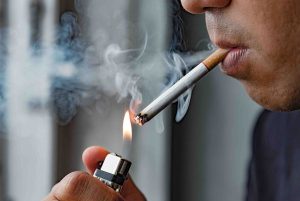Protecting Your Investment: How Does Smoking Affect Dental Implants?
Considering dental implants but have questions about how smoking might affect the outcome? It’s a valid concern, and at Dentiste, we believe in providing honest answers to help you make the best choice for your smile’s future. Let’s explore the relationship between smoking and dental implants with the best dentist in Kirkland.
Call us today at (425) 284-0515 to learn more. We proudly serve individuals exploring dental implant options in Kirkland and neighboring communities such as Redmond, Bellevue, and beyond.
Comprehensive Implant Dentistry Guide with One of Kirkland’s Best Dentists
Understanding the impact of smoking on dental implant success is paramount, and Dr. Stevie Roberts takes the time to openly discuss these factors with each individual considering this life-changing treatment. Her priority is to guide you toward a healthy and lasting smile free of early implant failure.
Choosing Dr. Roberts means selecting a dentist who combines skill with genuine care, addressing your concerns about smoking and its effects on implant outcomes with clear and compassionate guidance. Take the first step towards a healthier, more confident smile. Call Dentiste today at (425) 284-0515 to schedule your personalized consultation with Dr. Roberts, one of Kirkland’s dedicated dentists committed to your long-term implant survival and proper jaw bone healing.
How Smoking Compromises Dental Implant Outcomes
Smoking introduces a multitude of harmful chemicals into the oral environment, creating a hostile landscape for dental implant integration and long-term health. For residents of Kirkland, WA, who smoke and are considering dental implants, understanding these risks is the first step towards making an informed decision on your oral health with Dr. Roberts at our Kirkland office.
Research has shown that smokers have a 140.2% higher risk of conventional loading dental implant failure compared to non-smokers, emphasizing the importance of addressing smoking habits before undergoing this procedure.
- Impaired Blood Flow: Nicotine, a primary component of tobacco, constricts blood vessels, reducing the flow of oxygen and nutrients to the gums and jawbone. This impaired circulation hinders the crucial healing process following implant surgery, making it difficult for the implant to fuse properly with the bone (osseointegration).
- Increased Risk of Infection: Smoking weakens the immune system, making smokers more susceptible to oral infections, including peri-implantitis. This inflammatory condition attacks the soft and hard tissues surrounding the dental implant and is a leading cause of implant failure.
- Delayed Healing: The compromised blood supply in smokers significantly slows down the healing of the gums and bone after implant placement. This delay increases the window of vulnerability for infection and other complications.
- Higher Implant Failure Rates: Numerous studies have consistently demonstrated a substantially higher failure rate for dental implants in smokers compared to non-smokers. This increased risk underscores the importance of understanding the impact of smoking on treatment outcomes.
- Gum Disease** Progression:** Smokers are already at a significantly elevated risk for developing and progressing gum disease. This pre-existing condition further jeopardizes the health of the tissues supporting dental implants.
- Reduced Bone Density: Some research suggests that smoking can negatively affect bone density, a critical factor for successful osseointegration and long-term implant stability. Additionally, the mean difference in marginal bone loss between smokers and non-smokers is statistically significant, with smokers showing higher levels of bone loss.
Symptoms of Dental Implant Placement Failure
Dental implant failure is rare, but it does occur, especially for those who smoke and don’t follow post-op care guidelines. If you’re experiencing implant failure, you may notice the following symptoms:
- Inflamed or bleeding gums
- Severe oral pain
- Discomfort while chewing
- Gum recession
- Swelling at the surgical site
- Loose implant or replacement tooth
When you experience the symptoms mentioned above, call our Kirkland dental implant provider immediately at (425) 284-0515. Strict adherence to postoperative care can help mitigate risks for smokers, ensuring the best possible outcome for your dental implants.
Tips for Quitting Cigarette Smoking in Kirkland
If you’re considering dental implants at Dentiste in Kirkland, WA, and you currently smoke, taking steps to quit is one of the most significant actions you can take to improve the long-term success of dental implant surgery. Patients are advised to quit smoking at least several weeks before the procedure to enhance healing and reduce the risk of complications.
Here are some tips that may be helpful for our Kirkland patients:
- Explore Local Support Groups: Connecting with others in the Kirkland area who are also trying to quit can provide invaluable encouragement and a sense of community. While I don’t have real-time information on specific groups meeting today, resources like the King County Public Health website often list local support groups and programs available in Kirkland and the broader Seattle area. You might also find community-based groups meeting at local centers or through online searches specifically for Kirkland.
- Seek Professional Help in the Kirkland Area: Healthcare providers in Kirkland can offer resources and support to help you quit smoking. Your primary care physician or a specialist can provide guidance.
- Identify and Avoid Triggers: Pay attention to situations, emotions, or habits that trigger your urge to smoke, especially those related to your daily routine in Kirkland.
- Set a Quit Date and Prepare: Choose a specific date to quit that allows you enough time to mentally prepare and gather support. This could be a date tied to a personal milestone when you anticipate less stress in your schedule.
Frequently Asked Questions
Smoking with dental implants is strongly discouraged, as it can impair healing and increase the risk of implant failure. Smoking may lead to complications like infections or bone loss around the implant.
Dentists typically recommend quitting smoking at least 2 to 4 weeks before the dental implant procedure to improve healing and reduce complications. Ideally, you should remain smoke-free for 2 to 3 months after surgery to support osseointegration. Quitting for good is best for long-term implant success.
Smoking reduces blood flow to the gums and bone, slowing healing and increasing the risk of implant failure. It can also cause gum disease, bone loss, and infections around the implant. Studies show smokers have a higher implant failure rate, up to 20% in some cases.
Taking Control: Your Role in Dental Implant Treatment Success in Kirkland
Imagine the joy of a fully restored smile, allowing you to confidently enjoy the vibrant life of Kirkland, from a meal at a local favorite to a stroll along the waterfront, without the concerns associated with missing teeth. Dr. Roberts and the caring team at Dentiste are here to guide you towards this reality. Smokers can still receive dental implants despite potential complications, and our team is dedicated to helping you navigate these challenges for a successful outcome.
We welcome new patients from Kirkland, Redmond, Bellevue, and beyond. Take the first step towards a healthier, more confident you. Call us today at (425) 284-0515 for a dental implant consultation!


